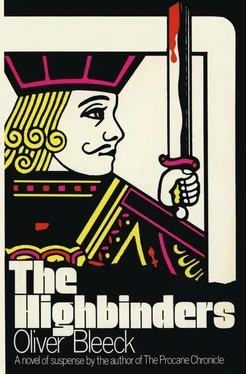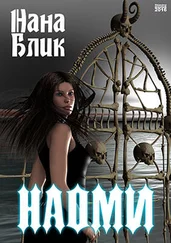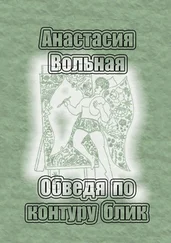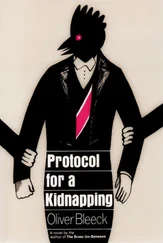“You’re just jealous, darling,” his wife said.
“You’re right. I am.”
At the end of the long wide hall that was lined with heavy oiled furniture and dim old paintings, the girl opened a door and stood to one side, smiling warmly at all of us. I thought that she probably smiled most of the time.
The red room was just that. Red. The walls were red plush and the curtains were red velvet and there was a dark maroon carpet on the floor and on it rested a lot of curved, ornate furniture that must have gone back to Victoria’s time. All of the furniture, except for some massive oak and mahogany tables, seemed to be upholstered in various shades of blending reds. There were also some paintings that looked vaguely familiar and there was one above the mantel that I especially wanted to take a closer look at once the introductions were over.
“Mr. St. Ives,” she said, “this is my father, Ned Nitry, and my uncle, Norbert Nitry.”
I shook hands with Ned first and then with Norbert. Both of them had Ned’s daughter’s eyes, except that where hers were blue-green, theirs were a tawny brown, so I suppose it was their bone structure she had and not their eyes. And while she had the look about her of a half-wild cat, they had the look of a couple of lazy lions who were getting a little long in the tooth, but not so much so that they couldn’t make their authority felt when they thought it was worth the effort.
“Do sit down, Mr. St. Ives, do,” said Ned Nitry and I sat down in a low plush armchair with an oval back.
Norbert Nitry moved over to a drinks tray and said, “Well, what’re we having, a touch of whisky? Whisky’s your drink, Eddie. What about you, Mr. St. Ives?”
“Whisky’s his drink, too, Bert,” Apex said.
“Water or soda?”
“Water,” I said.
“And sherry for my girl and gin and it for Ned and me,”Norbert Nitrysaid, mixed the drinks deftly, and served them around.
We sat there in the mansion in Belgravia and tasted our drinks and the scene was fine but the accents were all wrong. At least, the Nitry brothers’ accents were. They were both in their sixties, probably their early sixties, but it was hard to tell which was the elder. They were both of medium height and plump, if not fat, although it didn’t show in their faces too much because of those bones. They were closely barbered faces, a healthy pink, and although their hair might have been thinning on top it was thick and gray and long above the ears. They resembled each other enough to be taken for brothers, but not for twins. Ceil Apex’s father, Ned, had a mouth that was a bit thinner and a bit firmer than his brother’s. A bit harder really. Despite the careful barbering and the tendency toward plumpness, there was nothing soft about either of those faces with their tired lion eyes, blunt noses, lump chins, and those tight, wide mouths that twenty years ago might have been tough. Or just mean.
And although their tailor, probably the same one patronized by Eddie Apex, had done wonders for their figures, nobody had done anything for their accents which to me sounded more like Lambeth than Belgravia. I’m not that good on English accents. I can distinguish between Manchester and Mayfair, but not between Oxford and Sandhurst, if, indeed, there is anything to distinguish. The people who had sat on those same red plush Victorian chairs seventy-five or eighty years ago would, without a qualm, have called the Nitry brothers’ accents lower class. I’m not sure what they would have been called today. Working class maybe. Such accents in England were supposed to be a handicap to one’s upward economic mobility although they didn’t seem to have bothered the Nitry brothers any.
“Well,” Ned Nitry said, “Eddie tells us that you’ve already done a job of work for us.”
“I spent a night in jail, if that’s what you mean.”
“Doped your drink, did they?”
“That’s right.”
“I’m not surprised. They’re probably a nasty lot.”
“You’re talking about the thieves.”
“Correct. The thieves.”
“What did they steal from you?”
“Didn’t Eddie tell you?”
“He said they stole a sword. Offhand, I can’t think of many swords that’re worth anywhere near two or three million pounds.”
“Well, Bert’s our sword expert,” he said, turning to Uncle Norbert. “Tell him about the sword, Bert.”
Bert took a swallow of his gin, leaned his head back, and looked at the ceiling with the practiced gesture of the expert tale spinner. “Know much about the swords that were used in the age of chivalry, Mr. St. Ives?” he said, sounding the “ch” in chivalry like the “ch” in church.
“Your son-in-law exhausted my knowledge earlier today,” I said. “I know about Excalibur and Roland’s sword, Durandel, but the rest of what I know I got mostly from Prince Valiant.”
“Valiant? I can’t recall a Prince Valiant.”
“He’s in a comic strip but the guy who draws him seems to be fussy about details.”
“Well, no matter,” Bert said. “Arthur and Roland are long before the time I’m talking about. Long before. I’m talking about the time of the Crusades from about 1099 up to 1250. That’s A.D. Anno Domini.”
“There must have been a lot of swords around about that time,” I said because he had paused in his tale as if waiting for some comment and it was all I could think of to say.
“Ah, and what swords!” Uncle Bert said, warming to his subject. “Proper swords, they were, some with three-foot blades and perfect balance and weighing no more’n two or three pounds and sharp as carving knives, sharper than today’s, in fact, and just the thing for slicing through chain mail and armor plate.”
I remembered a film that I had seen as a child. It had been about the Crusades, probably the first one in 1099, and there had been a confrontation between the English and the Saracens. I guess they were the Saracens. At any rate, the Englishman was showing off his sword. He took an iron bar, about an inch thick, and with a mighty blow of his sword, slashed through it. The Saracen, an oily type, I recall, smiled disdainfully and said something such as, “You will still lose, Englishman. Your swords are not sharp enough.” And with that he drew his own, a wickedly curved job, tossed up a silk scarf, and let it float down upon his upturned blade which sliced it neatly in two.
“Have you ever heard of the Sword of St. Louis, Mr. St. Ives?”
“No.”
“Well, there are stories and stories about it. Some true, I’d say, but most not. But before he became a Saint, Louis was King of France, King Louis the Ninth. That’s fact. And in 1250 he led his Crusade into Egypt. That’s fact. And that same year he was defeated and captured by the Saracens at Mansourah. And that’s fact. But what happened to his sword?”
“I don’t know.”
“Nobody does,”Norbert said. “Not really, they don’t. Some say he buried it. Some say he painted it black and gave it to one of his knights for safekeeping. Nobody is quite sure what the knight did with it, but most think he flogged it.”
“To whom?”
“Nobody knows; probably another knight. But we don’t hear anything else about it, not even rumor, for nearly a century. Then it supposedly turns up in 1368, still in Egypt, but this time in the Hall of Victories in the Alexandria arsenal. It might have been taken by the Mameluke Sultans from somebody fighting with the king of Cyprus, Peter of Lusignan, who was also king of Jerusalem, titular king anyhow. He got defeated trying to take Cairo in 1365.”
“Then what?” I said.
“Then nothing. Not for another two centuries when it shows up in Constantinople in 1573. After that, there’s a rumor about its being in Moscow in 1731. The dimensions are right anyhow. The blade’s exactly thirty-four and a half inches long; the weight’s right, three pounds, two ounces; the crosspiece is straight, but curved down slightly at the ends; the hilt is solid metal painted black, and the pommel is about the size and shape of an oversized Brazil nut.”
Читать дальше











